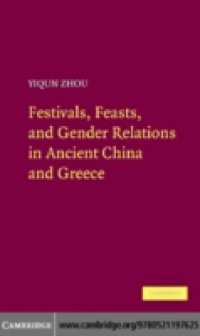Ancient China and Greece are two classical civilisations that have exerted far-reaching influence in numerous areas of human experience and are often invoked as the paradigms in East-West comparison. This book examines gender relations in the two ancient societies as reflected in convivial contexts such as family banquets, public festivals, and religious feasts. Two distinct patterns of interpersonal affinity and conflict emerge from the Chinese and Greek sources that show men and women organising themselves and interacting with each other in social occasions intended for collective pursuit of pleasure. Through an analysis of the two different patterns, Yiqun Zhou illuminates the different socio-political mechanisms, value systems, and fabrics of human bonds in the two classical traditions. Her book will be important for readers who are interested in the comparative study of societies, gender studies, women's history, and the legacy of civilisations.

